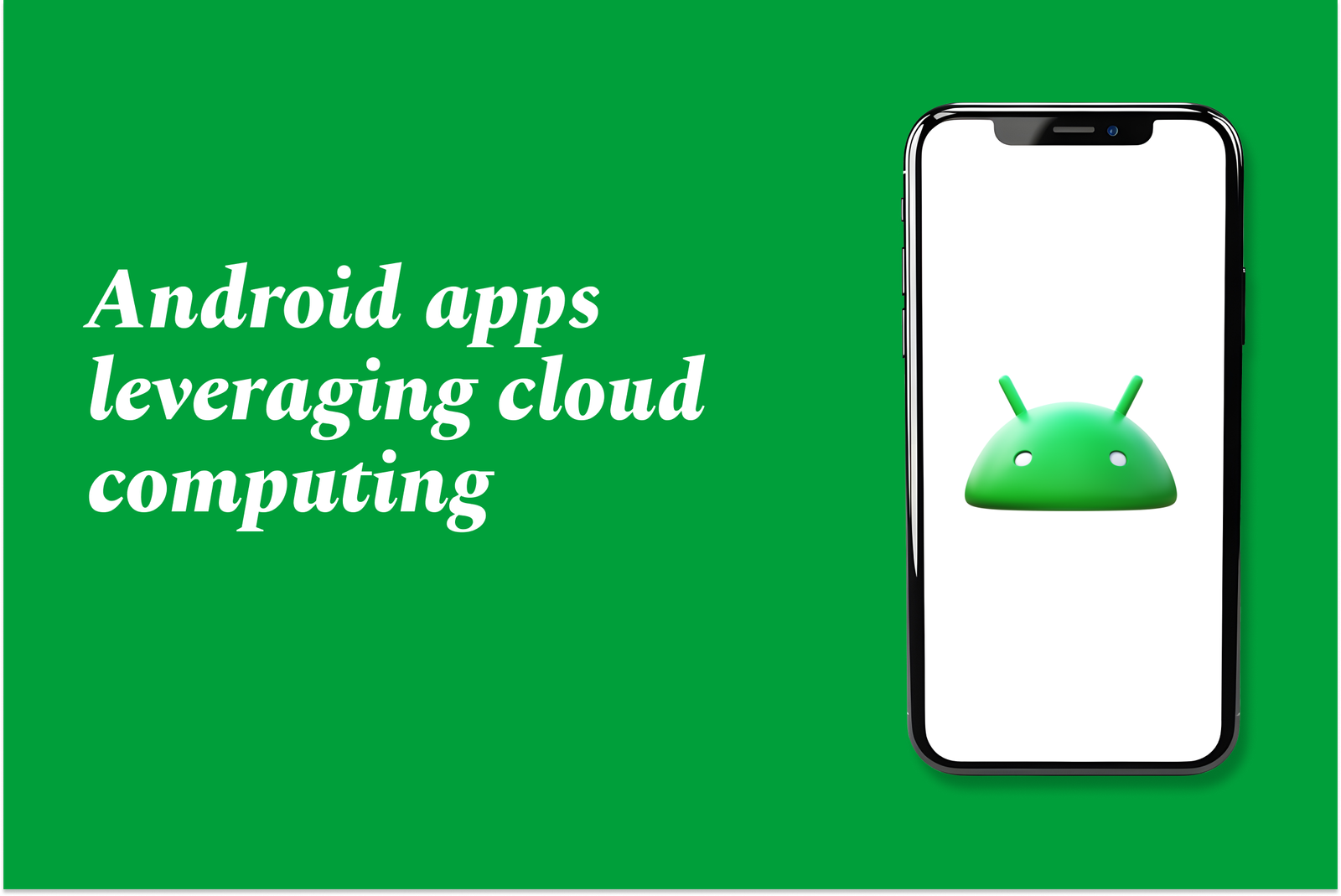Android Apps Leveraging Cloud Computing
Android apps leveraging cloud computing use remote servers to process data and store information, enhancing performance and scalability. This enables features like real-time updates, seamless storage, and advanced computing without relying solely on device hardware limitations.
Android apps leveraging cloud computing
1 ) Introduction to Cloud Computing in Mobile App Development
Cloud computing has become the foundational framework for modern mobile app development. It provides essential resources such as servers, storage, databases, and software accessible over the internet. This infrastructure enables developers to innovate and create advanced applications with benefits including scalability, cost reduction, and improved collaboration. Businesses leveraging cloud powered mobile apps maintain competitiveness in a digital first environment.
2 ) Evolution and Impact of Cloud Computing on Mobile Apps
Mobile app development has evolved from isolated local environments to global cloud based ecosystems. Cloud computing has revolutionized app building, deployment, and management by offloading processing and storage from mobile devices to remote cloud servers. This shift enables applications with enhanced functionality that would be otherwise limited by mobile hardware constraints.
3 ) Understanding Mobile Cloud Computing (MCC) and Mobile Cloud Apps
Mobile cloud computing (MCC) combines cloud resources with mobile device accessibility, allowing apps to delegate heavy computational tasks and data storage to the cloud.
Mobile cloud apps rely on cloud infrastructure for core functions, resulting in lightweight apps on devices but rich experiences enabled by powerful remote services.
Typical use cases include social media (seamless photo/video sharing), entertainment (real time content streaming), e commerce (secure payment processing and data storage), and healthcare (instant access to patient data on the go).
4 ) Key Benefits of Cloud Powered Mobile Applications
Enhanced Performance: Offloading processing to the cloud improves response times and handles data intensive operations efficiently.
Expanded Storage: Users benefit from virtually limitless cloud storage, freeing device memory and enabling handling of large files.
Flexibility and Scalability: Cloud apps dynamically adjust resources based on demand, enabling scalable solutions without physical device limitations.
Cost Efficiency: Cloud services reduce the need for expensive hardware upgrades and simplify app maintenance.
Improved Collaboration and Updates: Developers can push updates and manage apps more effectively using cloud platforms.
5 ) Leading Cloud Platforms Supporting Android App Development
Major cloud providers like Google Cloud, AWS, and Microsoft Azure offer a broad array of tailored services for mobile app development. Notably, Google Cloud offers extensive AI/ML tools and Firebase Studio to build intelligent Android apps, while AWS provides customizable cloud instances and AI agents. These platforms ensure secure, reliable, and scalable environments to meet diverse development needs.
6 ) Practical Applications and Future Outlook
Cloud computing continues to unlock new possibilities for Android apps, enabling integration with AI technologies, real time analytics, and seamless multi device experiences. Partnerships like Ford and Google’s pact to integrate Google Cloud and Android in vehicles exemplify cloud computing’s expansive role. Moving forward, the cloud will remain integral for delivering innovative, personalized, and high performance mobile applications.
https://justacademy.in/news-detail/flutter-now-supports-desktop-and-embedded-devices
https://justacademy.in/news-detail/building-ai-first-apps-with-flutter
https://justacademy.in/news-detail/top-animation-packages-for-flutter
https://justacademy.in/news-detail/best-ci/cd-tools-for-flutter-projects
https://justacademy.in/news-detail/devtools-updates-flutter-devs-should-know
Related Posts
Java supports GDPR and data privacy by enabling secure data handling through encryption, controlled access, and precise data management. It allows developers to minimize PII exposure, ensure data confidentiality, and design workflows that comply with data protection regulations effectively.
Java code quality tools have evolved to include advanced static analysis, integrated security checks, and AI-powered code reviews. These updates help developers detect bugs, enforce coding standards, and enhance security, streamlining the development process and improving overall code reliability.
Java remains a cornerstone in big tech companies, evolving with modern features like records, pattern matching, and virtual threads. Its robust ecosystem, enhanced performance, and growing AI integrations keep it vital for both legacy systems and innovative new projects.
Java and CI/CD pipeline optimizations streamline Java application development by automating builds, tests, and deployments. They improve efficiency through parallelization, caching, and secure secrets management, enabling faster feedback loops and more reliable, scalable software delivery.
Java supports modern cryptography standards through its flexible Java Cryptography Architecture (JCA), enabling integration of advanced algorithms like AES, EdDSA, and post-quantum tools. Libraries like Bouncy Castle offer FIPS-certified, hardware-accelerated implementations for secure development.
Java 23 enhances record patterns by enabling concise, direct destructuring of record components within pattern matching, simplifying type checks and data extraction. This improvement boosts code readability and expressiveness by reducing boilerplate in handling immutable data classes.
Java remains a top choice for mobile app backends, powering scalable, secure, and high-performance server-side solutions. Latest trends include cloud-native microservices, reactive programming, and enhanced JVM optimizations, enabling efficient, flexible, and robust mobile backend development.
Java SE 24 and LTS Java SE 21 offer enhanced features and performance, while Apache Spark 4.0.0 introduces Scala 2.13 support and advanced ML and SQL capabilities. Together, they empower developers to build scalable, high-performance data applications with modern tools.
JUnit 5 modernizes Java testing with a modular architecture, improved assertions, and seamless Java 8+ support. Beyond JUnit, tools like Mockito and AssertJ enhance mocking and assertions, creating a powerful, flexible ecosystem for writing clean, efficient Java unit tests.
Java plays a pivotal role in cloud automation tools by providing a robust, platform-independent language used to build scalable automation frameworks like Jenkins and Selenium, enabling efficient CI/CD pipelines, testing, and orchestration across diverse cloud environments.










